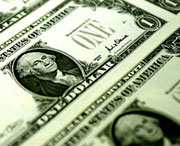|
 |
| US dollar bills. The US dollar slumped to an
eight-month low against the euro, before regaining some strength,
amid concerns about the US economy and a widening American trade
deficit. (AFP) |
The US dollar slumped to an eight-month low against the euro, before
regaining some strength, amid concerns about the US economy and a widening
American trade deficit.
At 2100 GMT, the euro was trading at 1.2585 dollars in late New York
trade, up from 1.2514 late Tuesday.
However, in earlier trading, the euro soared above
the 1.26-dollar mark for the first time since late February, striking
1.2627 dollars, as currency traders continued to fret
over the state of the US economy and
skyrocketing oil prices.
The dollar also declined against the yen, trading at 108.20 late
Wednesday from 108.28 a day earlier.
Traders said recent reports on the US economy had been tepid, and that
this has sparked fresh doubts about future interest rate hikes ahead of
the next Federal Reserve meeting on November 10.
"The dollar continues to lose ground against the major currencies as
traders assess just how quickly the United States can plug its growing
trade deficit," said Paul Jackson, a senior foreign exchange dealer at CMC
Group.
Amid lingering doubts over the widening trade deficit, weak equity
portfolio flows and outflows of foreign direct investment, some market
watchers said the dollar may weaker even further.
"We now project the euro at 1.27 dollars in one month and at the
all-time highs of 1.29 in three months," said Daniel Katzive at UBS.
West LB analysts said political considerations were also playing a hand
in depressing sentiment on the dollar.
"Not only is the (US presidential) election outcome too close to call,
but media coverage about the risk that a re-elected Bush government may
allow the differences with Iran to escalate do not calm market nerves,"
they said.
The dollar's decline comes a day after JP Morgan said net foreign
capital flows into the United States fell to 59 billion in August dollars
from a revised 63.1 billion in July.
The bank's analysts said such data highlight the lack of capital
inflows into the United States at a time when the trade deficit is set to
"test new all-time highs."
JP Morgan economists believe the current account deficit could reach
six percent of GDP by year end due to high oil prices and a persistent
US-foreign demand growth gap.
In late New York trade, the dollar stood at 1.2217 Swiss francs from
1.2291 Tuesday.
The pound stood at 1.8161 dollars after 1.8042.
(Xinhua) | 